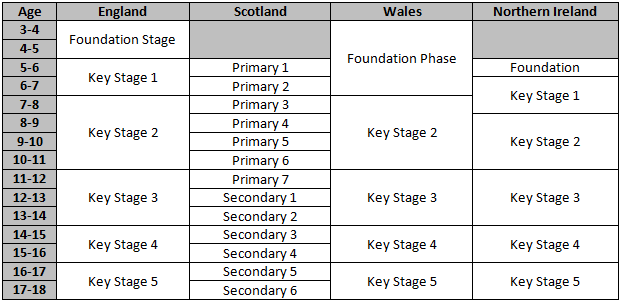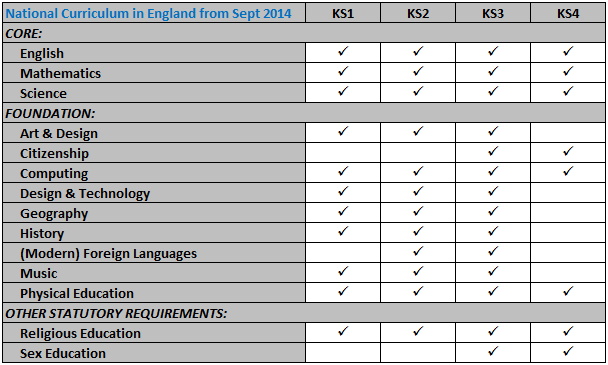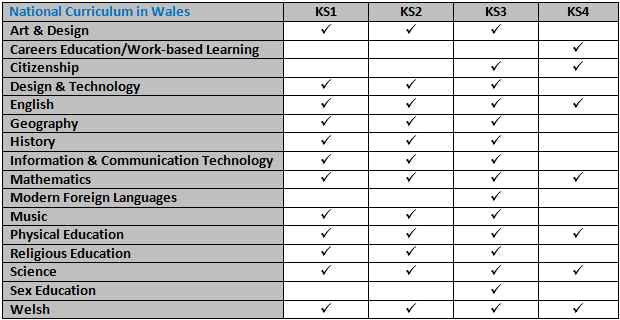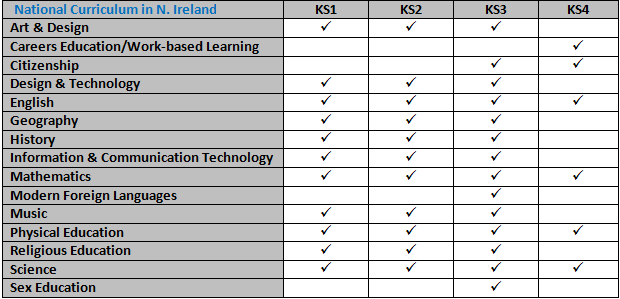Who learns what?
To understand the way in which we assess academic achievement in the UK we must first frame these exams in the context of each country and the curriculum being taught:
A curriculum is the structure in which school-age children are taught subjects deemed important for their education and development. Some curricula will be highly prescriptive while others will allow a great deal of freedom as long as learning objectives are met.
Curricula in the UK are based around school ages:

England’s National Curriculum & Examinations
National Curriculum
The Education Act 1988 established that all state schools must teach the National Curriculum and a basic curriculum of religious education and, over the last three decades, sex education has been added to create a triumvirate enshrined in law.
The Education Act 2002 asserted certain compulsory subjects (core and foundation) at KS4 and made it mandatory for schools to offer at least one subject in the arts, design and technology, humanities and modern foreign languages.
In January 2011, a little under a year after taking office, the Education Secretary announced a review of the National Curriculum. Following a number of consultations and reviews, it was announced by the DfE that “the new National Curriculum will set out only the essential knowledge that all children should acquire, and give schools and teachers more freedom to decide how to teach this most effectively and to design a wider school curriculum that best meets the needs of their pupils”. The disapplication of existing programmes of study commenced in September 2013, with the new National Curriculum introduced in September 2014 (or September 2015 for key stage 4 English, mathematics and science).

Examinations
Pupils in England undertake tests during each Key Stage to assess their academic progress. Until the end of the 2013/14 academic year there was a range of achievable levels for each assessment and an expected level for each too. From September 2014 levels have been removed and schools have the freedom to assess their pupils as they see fit outside of national tests. The KS1 test is carried out by teacher assessment, but the Statutory Assessment Tests (SATs) at KS2 and KS3 are marked externally and the results are published by the DfE.
Click through to find out more about the National Curriculum changes and ‘Life After Levels’.
Scotland’s Curriculum for Excellence & Examinations
Curriculum
The ‘Curriculum for Excellence’ was introduced for the 2011/12 academic year after starting out as a consultation exercise – the ‘National Debate on Education’ – in 2002. The new curriculum’s objective is to create successful learners, confident individuals, responsible citizens and effective contributors. This is to be achieved by the development of eight curriculum areas, rather than rigid subject structures:
- Expressive arts
- Health and wellbeing
- Languages
- Mathematics
- Religious and moral education
- Sciences
- Social studies
- Technologies
Similar to the criticism aimed at England’s incoming revised National Curriculum, the Curriculum for Excellence has been accused of giving too much freedom and making achievement intangible.
Examinations
National Assessment tests are taken by all pupils aged 5 to 14 in Scotland, with a simple pass/fail format for each of the levels (Level A to Level F).
Scottish secondary schools are moving from ‘Standard Grades’ to a new national qualifications framework so it’s not uncommon to find a school offering some subjects in the old format and some in the new.

Secondary qualifications have an A to D grading scale, with papers achieving less than 45% being marked as a fail.
Wales’ National Curriculum & Examinations
Curriculum
To a large extent, Welsh schools follow the National Curriculum, though English is not a statutory subject at KS1 in Welsh-medium schools and there may be more of an emphasis on the Welsh language and Welsh history.

Teaching in Welsh schools is focused much more on experiential learning in groups than seen in England.
Examinations
KS4 and KS5 examinations in Wales currently follow the same structure as GCSEs and A-Levels in England.
Northern Ireland’s National Curriculum & Examinations
Curriculum
Schools in Northern Ireland follow the National Curriculum, though the upcoming revisions in England will leave Northern Ireland more similarly aligned with Wales.

A key tenet of education in Northern Ireland is the development of knowledge and understanding through cross-curricula learning. This is similar to project-based learning in England, whereby students incorporate a number of disciplines to create a coursework-like folder or presentation.
Examinations
KS4 and KS5 examinations in Northern Ireland currently follow the same structure as GCSEs and A-Levels in England.
